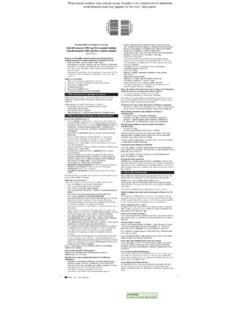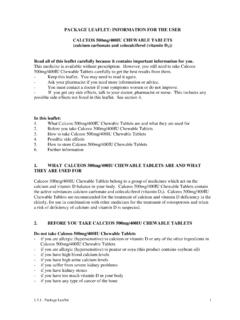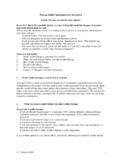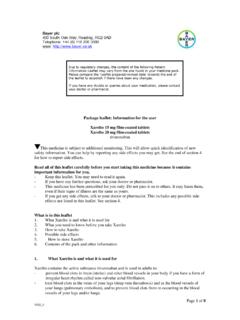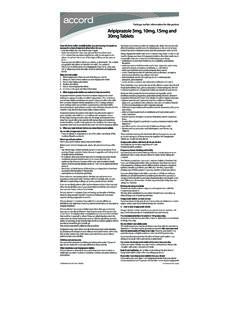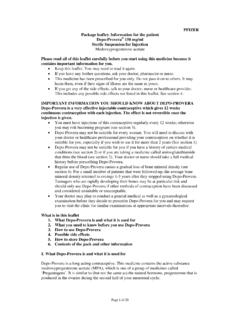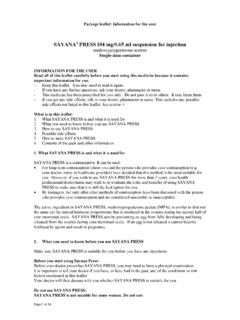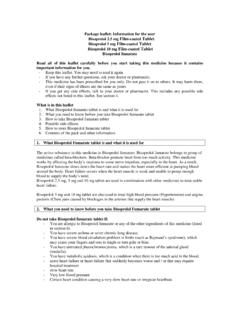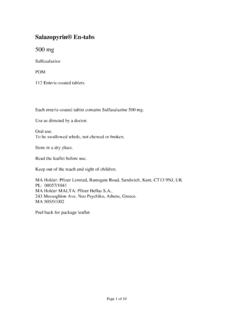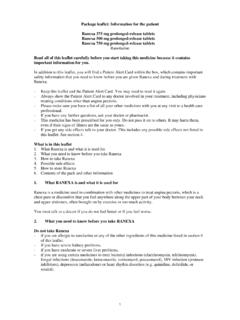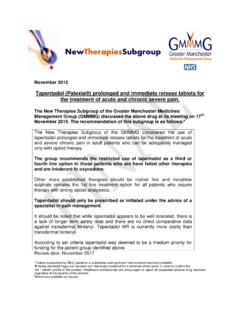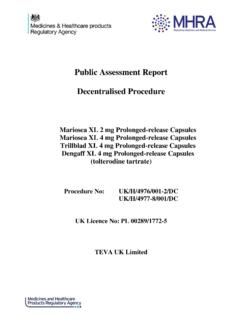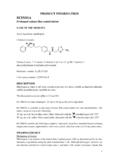Transcription of uk-mockup
1 PAGE 1 PAGE 4 What is in this leaflet:1. What Glucophage SR is and what it is used for2. What you need to know before you take Glucophage SR3. How to take Glucophage SR4. Possible side effects5. How to store Glucophage SR6. Content of the pack and other information1. What Glucophage SR is and what it is used forGlucophage SR prolonged release tablets contain the active ingredient metformin hydrochloride and belong to a group of medicines called biguanides, used in the treatment of Type 2 (non-insulin dependent) diabetes SR is used together with diet and exercise to lower the risk of developing Type 2 diabetes in overweight adults, when diet and exercise alone for 3 to 6 months have not been enough to control blood glucose (sugar).
2 You are at high risk of developing Type 2 diabetes if you have additional conditions like high blood pressure, age above 40 years, an abnormal amount of lipids (fat) in the blood or a history of diabetes during pregnancy. The medicine is particularly effective if you are aged below 45 years, are very overweight, have high blood glucose levels after a meal or developed diabetes during SR is used for the treatment of Type 2 diabetes when diet and exercise changes alone have not been enough to control blood glucose (sugar). Insulin is a hormone that enables body tissues to take glucose from the blood and to use it for energy or for storage for future use. People with Type 2 diabetes do not make enough insulin in their pancreas or their body does not respond properly to the insulin it does make.
3 This causes a build-up of glucose in the blood which can cause a number of serious long-term problems so it is important that you continue to take your medicine, even though you may not have any obvious symptoms. Glucophage SR makes the body more sensitive to insulin and helps return to normal the way your body uses SR is associated with either a stable body weight or modest weight SR Prolonged Release Tablets are specially made to release the drug slowly in your body and therefore are different to many other types of tablet containing What you need to know before you take Glucophage SRDo not take Glucophage SR if: you are allergic to metformin or to any of the other ingredients of this medicine (listed in section 6).
4 An allergic reaction may cause a rash, itching or shortness of breath. you have liver problems you have severely reduced kidney functionProlonged release tabletsmetformin hydrochloridePackage leaflet: Information for the userThis medicine is intended for adult patients onlyRead all of this leaflet carefully before you start taking this medicine because it contains important information for you. - Keep this leaflet. You may need to read it again. - If you have any further questions, ask your doctor or pharmacist. - This medicine has been prescribed for you. Do not pass it on to others. It may harm them, even if their symptoms are the same as yours. - If you get any side effects, talk to your doctor or pharmacist.
5 This includes any possible side effects not listed in this leaflet. See section rare (affects less than 1 person in 10,000): Decreased vitamin B12 levels Skin rashes including redness, itching and of side effectsIf you get any side effects, talk to your doctor or pharmacist. This includes any possible side effects not listed in this leaflet. You can also report side effects directly via the Yellow Card Scheme at: reporting side effects you can help provide more information on the safety of this How to store Glucophage SRKeep Glucophage SR tablets out of the sight and reach of not use them after the expiry date that is printed on the pack after EXP.
6 The expiry date refers to the last day of that medicinal product does not require any special storage should not be disposed of via wastewater or household waste. Ask your pharmacist how to dispose of medicines no longer required. These measures will help to protect the Contents of the pack and other informationWhat the tablets containEach prolonged release tablet contains 500, 750 or 1000 milligrams of the active ingredient metformin hydrochloride. The other ingredients are magnesium stearate, carmellose sodium and hypromellose. What Glucophage SR looks like and contents of the packThe 500 milligram tablets are white to off -white and round with 500 on one 750 milligram tablets are white to off -white and capsule-shaped with 750 on one side and MERCK on the other 1000 milligrams tablets are white to off-white and capsule-shaped with 1000 on one side and MERCK on the other SR is supplied in packs of 28 and 56 prolonged release SR 500 mg, 750 mg and 1000 mg Prolonged Release Tablets are manufactured for Merck Serono Ltd, Bedfont Cross, Stanwell Road, Feltham, Middlesex, TW14 8NX, UK by Merck Sant , 2 rue du Pressoir Vert.
7 45400 Semoy, leaflet was last revised in April 2017 Useful tips If you smoke, try to stop Take regular exercise Drink as little alcohol as possible Look after your feet. Ask about this at the surgery or hospital Carry a card, bracelet or disk saying you are diabetic Visit your diabetic clinic regularlyIf you want more information about diabetes contact:Diabetes UK Central OfficeMacleod House10 ParkwayLondon NW1 7 AATel: 020 7424 1000TW1021381TW1021381 MC-2004-2016 Barcode PlaceholderBarcode PlaceholderPAGE 3 PAGE 2 you have uncontrolled diabetes, with, for example, severe hyperglycaemia (high blood glucose), nausea, vomiting, diarrhoea, rapid weight loss, lactic acidosis (see Risk of lactic acidosis below) or ketoacidosis.
8 Ketoacidosis is a condition in which substances called ketone bodies accumulate in the blood and which can lead to diabetic pre-coma. Symptoms include stomach pain, fast and deep breathing, sleepiness or your breath developing an unusual, fruity smell. you have lost too much water from your body (dehydration). Dehydration may lead to kidney problems, which can put you at risk for lactic acidosis (see 'Warnings and precautions ). you have a severe infection, such as an infection affecting your lung or bronchial system or your kidney. Severe infections may lead to kidney problems, which can put you at risk for lactic acidosis (see 'Warnings and precautions ).
9 You have been treated for acute heart problems or have recently had a heart attack or have severe circulatory problems or breathing difficulties. This may lead to a lack in oxygen supply to tissue which can put you at risk for lactic acidosis (see 'Warnings and precautions ). you are a heavy drinker of alcohol. you are under 18 years of and precautionsRisk of lactic acidosis Glucophage SR may cause a very rare, but very serious side effect called lactic acidosis, particularly if your kidneys are not working properly. The risk of developing lactic acidosis is also increased with uncontrolled diabetes, serious infections, prolonged fasting or alcohol intake, dehydration (see further information below), liver problems and any medical conditions in which a part of the body has a reduced supply of oxygen (such as acute severe heart disease).
10 If any of the above apply to you, talk to your doctor for further taking Glucophage SR for a short time if you have a condition that may be associated with dehydration (significant loss of body fluids) such as severe vomiting, diarrhoea, fever, exposure to heat or if you drink less fluid than normal. Talk to your doctor for further taking Glucophage SR and contact a doctor or the nearest hospital immediately if you experience some of the symptoms of lactic acidosis, as this condition may lead to coma. Symptoms of lactic acidosis include: vomiting stomach ache (abdominal pain) muscle cramps a general feeling of not being well with severe tiredness difficulty in breathing reduced body temperature and heartbeatLactic acidosis is a medical emergency and must be treated in a you need to have major surgery you must stop taking Glucophage SR during and for some time after the procedure.

